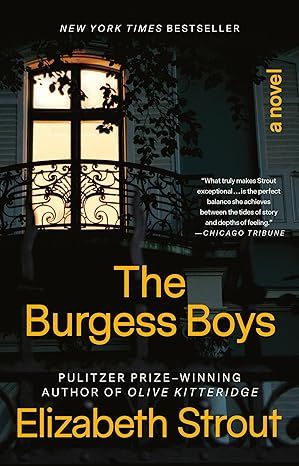The Burgess Boys: A Novel
4.1
-
11,063 ratings
NEW YORK TIMES BESTSELLER • From the Pulitzer Prize–winning author of Olive Kitteridge and My Name is Lucy Barton comes “a portrait of an American community in turmoil that’s as ambitious as Philip Roth’s American Pastoral but more intimate in tone” (Time).
“What truly makes Strout exceptional . . . is the perfect balance she achieves between the tides of story and depths of feeling.”—Chicago Tribune
A BEST BOOK OF THE YEAR: The Washington Post, NPR, Good Housekeeping
Haunted by the freak accident that killed their father when they were children, Jim and Bob Burgess escaped from their Maine hometown of Shirley Falls for New York City as soon as they possibly could. Jim, a successful corporate lawyer, has belittled his bighearted brother their whole lives, and Bob, a Legal Aid attorney who idolizes Jim, has always taken it in stride. But their long-standing dynamic is upended when their sister, Susan—the Burgess sibling who stayed behind—urgently calls them home, where the long-buried tensions that have shaped and shadowed the brothers’ relationship begin to surface in unexpected ways that will change them forever.
This edition includes an original essay by Elizabeth Strout about the origins of The Burgess Boys.
Kindle
$12.99
Available instantly
Audiobook
$0.00
with membership trial
Hardcover
$2.11
Paperback
$9.99
Ships from
Amazon.com
Payment
Secure transaction
ISBN-10
0812979516
ISBN-13
978-0812979510
Print length
352 pages
Language
English
Publisher
Random House Trade Paperbacks
Publication date
April 07, 2014
Dimensions
5.2 x 0.7 x 8 inches
Item weight
2.31 pounds
Product details
ASIN :
B009MYAWIA
File size :
4759 KB
Text-to-speech :
Enabled
Screen reader :
Supported
Enhanced typesetting :
Enabled
X-Ray :
Enabled
Word wise :
Enabled
Editorial reviews
Amazon.com Review
An Amazon Best Book of the Month, March 2013: It can’t be easy to sit down and write a new novel after your last, Olive Kitteridge, won the Pulitzer Prize (in 2009). The pressure! The pressure! In The Burgess Boys, novelist Elizabeth Strout somehow manages to survive whatever next-book anxiety while at the same time revisiting the themes and types of characters that have made her famous: plainspoken Mainers (some transplanted now to Brooklyn) bound together by both love, competitiveness and the issues of the day. Here, hotshot lawyer Jim and bighearted Bob Burgess come together over a politically incorrect prank perpetrated by their sister’s son--and discover that their distrust of each other has never really gone away. But then, neither has their love. Nobody does buried conflict and tortured familial relations better than Strout. --Sara Nelson
From Booklist
Pulitzer Prize–winning Strout (Olive Kitteridge, 2008) delivers a tightly woven yet seemingly languorous portrayal of a family in longtime disarray. Brothers Jim and Bob Burgess, and sister Susan, are mired in a childhood trauma: when he was four, Bob unwittingly released the parking brake on the family car, which ran over their father and killed him. Originally from small Shirley Falls, Maine, the Burgess brothers have long since fled to vastly disparate lives as New York City attorneys. Egoistic Jim is a famous big shot with a corporate firm. Self-effacing Bob leads a more low-profile career with Legal Aid. High-strung Susan calls them home to fix a family crisis: her son stands accused of a possible hate crime against the small town’s improbable Somali population. The siblings’ varying responses to the crisis illuminate their sheer differences while also recalling their shared upbringing, forcing them finally to deal with their generally unmentioned, murky family history. Strout’s tremendous talent at creating a compelling interest in what seems on the surface to be the barest of actions gives her latest work an almost meditative state, in which the fabric of family, loyalty, and difficult choices is revealed in layer after artful layer. HIGH-DEMAND BACKSTORY: This is the first novel from Strout since her Pulitzer Prize–winning, runaway best-seller, Olive Kitteridge, and anticipation will be high. --Julie Trevelyan
Review
“Strout’s prose propels the story forward with moments of startlingly poetic clarity.”—The New Yorker
“Elizabeth Strout’s first two books, Abide with Me and Amy and Isabelle, were highly thought of, and her third, Olive Kitteridge, won the Pulitzer Prize in fiction. But The Burgess Boys, her most recent novel, is her best yet.”—The Boston Globe
“Strout’s greatest gift as a writer, outside a diamond-sharp precision that packs 320 fast-paced pages full of insight, is her ability to let the reader in on all the rancor of her characters without making any of them truly detestable. . . . Strout creates a portrait of an American community in turmoil that’s as ambitious as Philip Roth’s American Pastoral but more intimate in tone.”—Time
“[Strout’s] extraordinary narrative gifts are evident again. . . . At times [The Burgess Boys is] almost effortlessly fluid, with superbly rendered dialogue, sudden and unexpected bolts of humor and . . . startling riffs of gripping emotion.”—Associated Press
“[Strout] is at her masterful best when conjuring the two Burgess boys. . . . Scenes between them ring so true.”—San Francisco Chronicle
“No one should be surprised by the poignancy and emotional vigor of Elizabeth Strout’s new novel. But the broad social and political range of The Burgess Boys shows just how impressively this extraordinary writer continues to develop.”—The Washington Post
“Strout deftly exposes the tensions that fester among families. But she also takes a broader view, probing cultural divides. . . . Illustrating the power of roots, Strout assures us we can go home again—though we may not want to.”—O: The Oprah Magazine
“Reading an Elizabeth Strout novel is like peering into your neighbor’s windows. . . . There is a nuanced tension in the novel, evoked by beautiful and detailed writing. Strout’s manifestations of envy, pride, guilt, selflessness, bigotry and love are subtle and spot-on.”—Minneapolis Star Tribune
“Strout conveys what it feels like to be an outsider very well, whether she’s delving into the quiet inner lives of Somalis in Shirley Falls or showing how the Burgess kids got so alienated from one another. But the details are so keenly observed, you can connect with the characters despite their apparent isolation. . . . [A] gracefully written novel. [Grade:] A.”—Entertainment Weekly
“Wincingly funny, moving, wise.”—Good Housekeeping
“With her signature lack of sentimentality, a boatload of clear-eyed compassion and a penetrating prose style that makes the novel riveting, Strout tells the story of one Maine family, transformed. Again and again, she identifies precisely the most complex of filial emotions while illuminating our relationships to the larger families we all belong to: a region, a city, America and the world.”—More
“The Burgess Boys returns to coastal Maine [with] a grand unifying plot, all twists and damage and dark, morally complex revelations. . . . The grand scale suits Strout, who now adds impresario storytelling at book length to the Down East gift for plainspoken wisdom.”—Town & Country
About the Author
Elizabeth Strout is the #1 New York Times bestselling author of Olive Kitteridge, winner of the Pulitzer Prize; Olive, Again, an Oprah’s Book Club pick; Anything Is Possible, winner of the Story Prize; My Name is Lucy Barton, longlisted for the Man Booker Prize; The Burgess Boys, named one of the best books of the year by The Washington Post and NPR; Abide with Me, a national bestseller; and Amy and Isabelle, winner of the Los Angeles Times Art Seidenbaum Award for First Fiction and the Chicago Tribune Heartland Prize. She has also been a finalist for the National Book Critics Circle Award, the PEN/Faulkner Award for Fiction, the International Dublin Literary Award, and the Orange Prize. Her short stories have been published in a number of magazines, including The New Yorker and O: The Oprah Magazine. Elizabeth Strout lives in New York City.
Read more
Sample
1
On a breezy October afternoon in the Park Slope neighborhood of Brooklyn, New York, Helen Farber Burgess was packing for vacation. A big blue suitcase lay open on the bed, and clothes her husband had chosen the night before were folded and stacked on the lounge chair nearby. Sunlight kept springing into the room from the shifting clouds outside, making the brass knobs on the bed shine brightly and the suitcase become very blue. Helen was walking back and forth between the dressing room—with its enormous mirrors and white horsehair wallpaper, the dark woodwork around the long window—walking between that and the bedroom, which had French doors that were closed right now, but in warmer weather opened onto a deck that looked out over the garden. Helen was experiencing a kind of mental paralysis that occurred when she packed for a trip, so the abrupt ringing of the telephone brought relief. When she saw the word private, she knew it was either the wife of one of her husband’s law partners—they were a prestigious firm of famous lawyers—or else her brother-in-law, Bob, who’d had an unlisted number for years but was not, and never would be, famous at all.
“I’m glad it’s you,” she said, pulling a colorful scarf from the bureau drawer, holding it up, dropping it on the bed.
“You are?” Bob’s voice sounded surprised.
“I was afraid it would be Dorothy.” Walking to the window, Helen peered out at the garden. The plum tree was bending in the wind, and yellow leaves from the bittersweet swirled across the ground.
“Why didn’t you want it to be Dorothy?”
“She tires me right now,” said Helen.
“You’re about to go away with them for a week.”
“Ten days. I know.”
A short pause, and then Bob said, “Yeah,” his voice dropping into an understanding so quick and entire—it was his strong point, Helen thought, his odd ability to fall feetfirst into the little pocket of someone else’s world for those few seconds. It should have made him a good husband but apparently it hadn’t: Bob’s wife had left him years ago.
“We’ve gone away with them before,” Helen reminded him. “It’ll be fine. Alan’s an awfully nice fellow. Dull.”
“And managing partner of the firm,” Bob said.
“That too.” Helen sang the words playfully. “A little difficult to say, ‘Oh, we’d rather go alone on this trip.’ Jim says their older girl is really messing up right now—she’s in high school—and the family therapist suggested that Dorothy and Alan get away. I don’t know why you ‘get away’ if your kid’s messing up, but there we are.”
“I don’t know either,” Bob said sincerely. Then: “Helen, this thing just happened.”
She listened, folding a pair of linen slacks. “Come on over,” she interrupted. “We’ll go across the street for dinner when Jim gets home.”
After that she was able to pack with authority. The colorful scarf was included with three white linen blouses and black ballet flats and the coral necklace Jim had bought her last year. Over a whiskey sour with Dorothy on the terrace, while they waited for the men to shower from golf, Helen would say, “Bob’s an interesting fellow.” She might even mention the accident—how it was Bob, four years old, who’d been playing with the gears that caused the car to roll over their father and kill him; the man had walked down the hill of the driveway to fix something about the mailbox, leaving all three young kids in the car. A perfectly awful thing. And never mentioned. Jim had told her once in thirty years. But Bob was an anxious man, Helen liked to watch out for him.
“You’re rather a saint,” Dorothy might say, sitting back, her eyes blocked by huge sunglasses.
Helen would shake her head. “Just a person who needs to be needed. And with the children grown—” No, she’d not mention the children. Not if the Anglins’ daughter was flunking courses, staying out until dawn. How would they spend ten days together and not mention the children? She’d ask Jim.
Helen went downstairs, stepped into the kitchen. “Ana,” she said to her housekeeper, who was scrubbing sweet potatoes with a vegetable brush. “Ana, we’re going to eat out tonight. You can go home.”
The autumn clouds, magnificent in their variegated darkness, were being spread apart by the wind, and great streaks of sunshine splashed down on the buildings on Seventh Avenue. This is where the Chinese restaurants were, the card shops, the jewelry shops, the grocers with the fruits and vegetables and rows of cut flowers. Bob Burgess walked past all these, up the sidewalk in the direction of his brother’s house.
Bob was a tall man, fifty-one years old, and here was the thing about Bob: He was a likeable fellow. To be with Bob made people feel as if they were inside a small circle of us-ness. If Bob had known this about himself his life might have been different. But he didn’t know it, and his heart was often touched by an undefined fear. Also, he wasn’t consistent. Friends agreed that you could have a great time with him and then you’d see him again and he’d be vacant. This part Bob knew, because his former wife had told him. Pam said he went away in his head.
“Jim gets like that too,” Bob had offered.
“We’re not talking about Jim.”
Waiting at the curb for the light to change, Bob felt a swell of gratitude toward his sister-in-law, who’d said, “We’ll go across the street for dinner when Jim gets home.” It was Jim he wanted to see. What Bob had watched earlier, sitting by the window in his fourth-floor apartment, what he had heard in the apartment down below—it had shaken him, and crossing the street now, passing a coffee shop where young people sat on couches in cavernous gloom with faces mesmerized by laptop screens, Bob felt removed from the familiarity of all he walked by. As though he had not lived half his life in New York and loved it as one would a person, as though he had never left the wide expanses of wild grass, never known or wanted anything but bleak New England skies.
“Your sister just called,” said Helen as she let Bob in through the grated door beneath the brownstone’s stoop. “Wanted Jim and sounded grim.” Helen turned from hanging Bob’s coat in the closet, adding, “I know. It’s just the way she sounds. But I still say, Susan smiled at me once.” Helen sat on the couch, tucking her legs in their black tights beneath her. “I was trying to copy a Maine accent.”
Bob sat in the rocking chair. His knees pumped up and down.
“No one should try and copy a Maine accent to a Mainer,” Helen continued. “I don’t know why the Southerners are so much nicer about it, but they are. If you say ‘Hi, y’all’ to a Southerner, you don’t feel like they’re smirking at you. Bobby, you’re all jumpy.” She leaned forward, patting the air. “It’s all right. You can be jumpy as long as you’re okay. Are you okay?”
All his life, kindness had weakened Bob, and he felt now the physicality of this, a sort of fluidity moving through his chest. “Not really,” he admitted. “But you’re right about the accent stuff. When people say, ‘Hey, you’re from Maine, you can’t get they-ah from he-yah,’ it’s painful. Painful stuff.”
“I know that,” Helen said. “Now you tell me what happened.”
Bob said, “Adriana and Preppy Boy were fighting again.”
“Wait,” said Helen. “Oh, of course. The couple below you. They have that idiot little dog who yaps all the time.”
“That’s right.”
“Go on,” Helen said, pleased she’d remembered this. “One second, Bob. I have to tell you what I saw on the news last night. This segment called ‘Real Men Like Small Dogs.’ They interviewed these different, sort of—sorry—faggy-looking guys who were holding these tiny dogs that were dressed in plaid raincoats and rubber boots, and I thought: This is news? We’ve got a war going on in Iraq for almost four years now, and this is what they call news? It’s because they don’t have children. People who dress their dogs like that. Bob, I’m awfully sorry. Go on with your story.”
Helen picked up a pillow and stroked it. Her face had turned pink, and Bob thought she was having a hot flash, so he looked down at his hands to give her privacy, not realizing that Helen had blushed because she’d spoken of people who did not have children—as Bob did not.
“They fight,” Bob said. “And when they fight, Preppy Boy—husband, they’re married—yells the same thing over and over. ‘Adriana, you’re driving me fucking crazy.’ Over and over again.”
Helen shook her head. “Imagine living like that. Do you want a drink?” She rose and went to the mahogany cupboard, where she poured whiskey into a crystal tumbler. She was a short, still shapely woman in her black skirt and beige sweater.
Bob drank half the whiskey in one swallow. “Anyways,” he continued, and saw a small tightening on Helen’s face. She hated how he said “Anyways,” though he always forgot this, and he forgot it now, only felt the foreboding of failure. He wasn’t going to be able to convey the sadness of what he had seen. “She comes home,” Bob said. “They start to fight. He does his yelling thing. Then he takes the dog out. But this time, while he’s gone, she calls the police. She’s never done that before. He comes back and they arrest him. I heard the cops tell him that his wife said he’d hit her. And thrown her clothes out the window. So they arrested him. And he was amazed.”
Helen’s face looked as if she didn’t know what to say.
“He’s this good-looking guy, very cool in his zip-up sweater, and he stood there crying, ‘Baby, I never hit you, baby, seven years we’ve been married, what are you doing? Baby, pleeeease!’ But they cuffed him and walked him across the street in broad daylight to the cruiser and he’s spending the night in the pens.” Bob eased himself out of the rocking chair, went to the mahogany cupboard, and poured himself more whiskey.
“That’s a very sad story,” said Helen, who was disappointed. She had hoped it would be more dramatic. “But he might have thought of that before he hit her.”
“I don’t think he did hit her.” Bob returned to the rocking chair.
Helen said musingly, “I wonder if they’ll stay married.”
“I don’t think so.” Bob was tired now.
“What bothered you most, Bobby?” Helen asked. “The marriage falling apart, or the arrest?” She took it personally, his expression of not finding relief.
Bob rocked a few times. “Everything.” He snapped his fingers. “Like that, it happened. I mean, it was just an ordinary day, Helen.”
Helen plumped the pillow against the back of the couch. “I don’t know what’s ordinary about a day when you have your husband arrested.”
Turning his head, Bob saw through the grated windows his brother walking up the sidewalk, and a small rush of anxiety came to him at the sight of this: his older brother’s quick gait, his long coat, the thick leather briefcase. There was the sound of the key in the door.
“Hi, sweetheart,” said Helen. “Your brother’s here.”
“I see that.” Jim shrugged off his coat and hung it in the hall closet. Bob had never learned to hang up his coat. What is it with you?, his wife, Pam, used to ask, What is it, what is it, what is it? And what was it? He could not say. But whenever he walked through a door, unless someone took his coat for him, the act of hanging it up seemed needless and . . . well, too difficult.
“I’ll go.” Bob said. “I have a brief to work on.” Bob worked in the appellate division of Legal Aid, reading case records at the trial level. There was always an appeal that required a brief, always a brief to be worked on.
“Don’t be silly,” said Helen. “I said we’d go across the street for supper.”
“Out of my chair, knucklehead.” Jim waved a hand in Bob’s direction. “Glad to see you. It’s been what, four days?”
“Stop it, Jim. Your brother saw that downstairs neighbor of his taken away in handcuffs this afternoon.”
“Trouble in the graduate dorm?”
“Jim, stop.”
“He’s just being my brother,” Bob said. He moved to the couch, and Jim sat down in the rocking chair.
Read more
About the authors
Elizabeth Strout
Elizabeth Strout is the author of the New York Times bestseller Olive Kitteridge, for which she was awarded the Pulitzer Prize; the national bestseller Abide with Me; and Amy and Isabelle, winner of the Los Angeles Times Art Seidenbaum Award and the Chicago Tribune Heartland Prize. She has also been a finalist for the PEN/Faulkner Award and the Orange Prize in London. She lives in Maine and New York City.
Read more
Reviews
Customer reviews
4.1 out of 5
11,063 global ratings
aPriL does feral sometimes
5
Continues a conversation started by William Golding
Reviewed in the United States on August 17, 2013
Verified Purchase
This is a subtle and layered story about a middle-class dysfunctional family. Yes, I know. Another one. Maybe you've had your fill of novels about how American families disintegrate for the year, but I must insist you read this one if you are a literary reader. It's different. I promise.
I admit to a certain strong cynicism I beat down within myself whenever picking up a suburban green lawn, 2.3 kid, two-car mid-life sandwich family story or a book which turns out to be a small-town whine about growing up restrained by conservative values while protected by said same. I have a smaller sneer in my heart when the story takes place in middle-class city neighborhoods, mostly due to more shared values between myself and the characters - or at least, some shared life experiences. However, I grew up poor; thus, the sneer. I got educated; thus, the love of literature reads, whatever the environment. I prefer mysteries, science fiction, horror and emotional tragedy reads, with strong writing components developed around big ideas (and small dramas), which is how literary reads have found their way onto my reading lists. Subtle works for me only if the story reveals a dreadful horror hidden within, usually. I find most cozies a huge bore, unless well-written and imbued with clever slyness. The Romance genre is dead to me. Given my preferences, I almost gave up on this because it seemed like normal, cozy-inspired, family drama. If it had been longer, I would have quit. Fortunately for me, it was short. It slowly dawned on me how smart it was, and eventually there was a moment when I stood up stunned by the depth of the author's understanding of how people live.
I don't really want to say what the plot is about because I experienced this novel the way I live through the daily opening of a flower in a garden. Each day reveals more and more delight. I listened to it the first time I 'read' it as a library audiobook. It was so good, I bought the ebook.
What is a good life if you are a human being in an open culture? Is it accomplished through emphasizing individuality or community? Do you want comforting (or smothering) conformity with rigidly defined roles or a 'Live Free or Die' environment (thank you New Hampshire)? Are people REALLY free to choose who they are, whatever 'free' society they must live in? Is there an achievable balance possible in bringing individuals together for a successful community, whether it be familial, tribal or governmental? The author presents us with the cultural choices of the USA vs. Somalia vs. Sweden during the progress of the book, but it's really a red herring conversation. I think what Strout is actually demonstrating in her novel is that we are defined by our perceptions, whatever the cultural framework or individual freedoms with which we've been theoretically graced. Free will is only of use insofar as you understand the imposed and invisible boundaries of society and history.
Perhaps the worst thing we do is manipulating the role we choose for others to live.
I loved this book and I consider it a masterful work, if not a masterpiece. It has so many levels of understanding and wisdom an expert critic could fill the pages of a literary magazine with its ideas and characters. I wish I could give it that expertise, but I'll simply witness to interested readers on how much I enjoyed reading it.
While the insightful exploration of family dynamics reminded me of a Thornton Wilder play, the real clue to the author's intention, I think, was the introduction of the pig's head. What else could that be but a hint of some kind of reference to The Lord of the Flies by William Golding? Having finished The Burgess Boys, I feel confirmed in my suspicion. Even better, I think the author added to the conversation that that allegorical story of Golding started.
Why do many societies devolve into dictatorships and brutality? In Somalia, religion was the gateway to societal collapse. In the USA, the hierarchical order of religion, family or culture is more benign, but the light control nonetheless is felt as a threat to personal liberty, so we've (I'm an American) swung the other way - so much that we often appear to be under the dictatorship and cruelty of individualism. And Sweden? There have been many articles touting Sweden as the perfect society, with extreme taxation enabling a happy people without any worries. Really? Other articles have exposed that eliminating existential concerns about housing, education and health has not eliminated the dark side of human nature. It appears we carry along baggage impossible to lose.
Real criminality may be in ALL manipulation of other people that benefits yourself alone, at the expense of the others. Criminal codes of government, religion or tribe can only cover the visible physical damage, but true indecency is the emotional devastation of secrets and lies hiding your own culpability. Yet, despite every designed effort and institution that humanity has developed to control our baser natures, those aspects of ourselves which harm others, the dark side of humanity surfaces again and again. It's obvious to me that people have reinvented and renamed our fragmented but inseparable parts we call our personalities over and over, which actually reflects what scientists are discovering about our brains, into concise and excisable sections which only exist conceptually. I think what we call our 'dark side' is not a SIDE at all, but in reality thoroughly incorporated in the warp and weft of who we are.
Does that mean we submit to the horrors of Lord of the Flies? I think Strout is picking up the conversation where Golding abandoned it. Among the huge inventory of evolved genetic tools we have inherited from our ancestors, whether we be Americans, Somalis or Swedes, we have the capability of forgiveness. It is very likely the greatest bits of DNA that people possess to ensure our survival living with each other.
Read more
14 people found this helpful
Laura
5
An Amazing Novel. A Brilliant Read
Reviewed in the United States on August 10, 2024
Verified Purchase
How does a writer capture the complexities, the connections and ironies of our humanity with such understanding and grace? Elizabeth Strout’s creativity and skill as well as love of people has enabled this. Working on both the micro and the macro levels, the personal and the universal levels, Strout narrates the story of a family caught up in personal tragedies against the background of a nation and a world facing their own struggles. The interconnections are revealed. Additionally, Strout provides deep insights into this micro/macro relationship and uncovers possibilities for redemption. A beautiful novel.
Read more
Digital Rights
5
My favorite Strout so far
Reviewed in the United States on February 6, 2024
Verified Purchase
I've read about half of Elizabeth Strout's books. This is my favorite so far. The Lucy Barton books were rewarding in a different way; in what is not said and the quiet parts between the lines. I'd say this is the opposite. The characters - the three Burgess siblings; Jim, Bob and Susan are anything but understated. Each is a devil of a person to understand; rigid in their own ways and carrying a lot of baggage, resentments and either a chip on the shoulder or a whimper of humiliation. How they work through 50 years of slowly piling on the slights, silences and insults is what this is all about and it's so compelling. There is lots going on. Wives, ex-wives, ex-husbands and children linger around the edges. No one is 100% nice and the author plays well to the ideas of memory, interpretation and characters where you can love and hate them as you turn the page. I absolutely was riveted throughout and rank this very highly as a very satisfying read.
My order of books The Burgess Boys Olive Again My Name is Lucy Barton Oh William Lucy By the Sea Olive Kitteridge
Read more
Top Elizabeth Strout titles
View all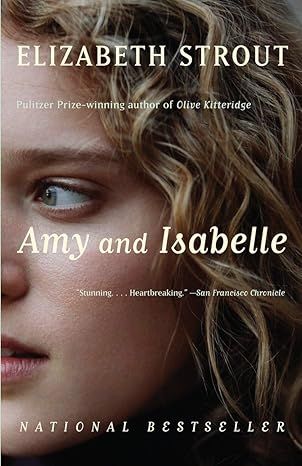
Amy and Isabelle: A novel
4.3
-
9,403
$3.34
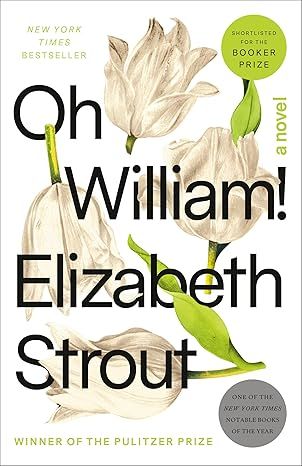
Oh William!: A Novel
4.2
-
22,498
$5.04
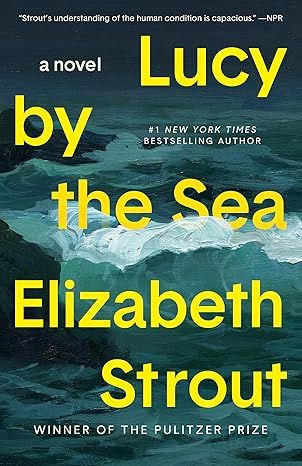
Lucy by the Sea: A Novel
4.3
-
18,461
$4.00
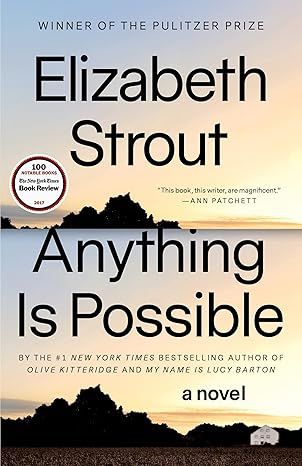
Anything Is Possible: A Novel
4
-
19,323
$5.35
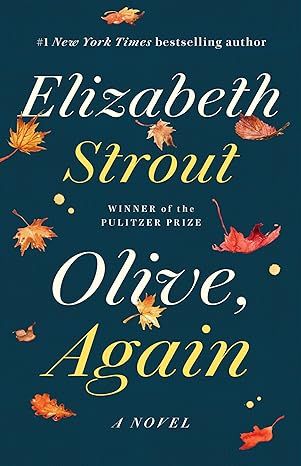
Olive, Again: A Novel (Olive, 2)
4.4
-
24,861
$9.76
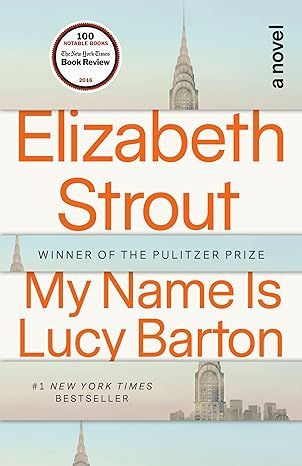
My Name Is Lucy Barton: A Novel
3.8
-
36,168
$7.94
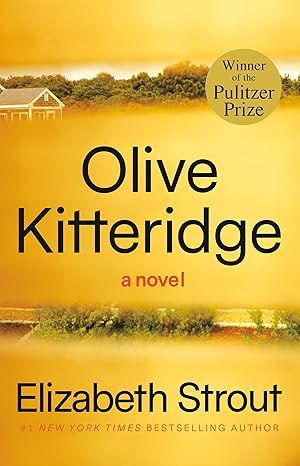
Olive Kitteridge
4.2
-
30,647
$9.49
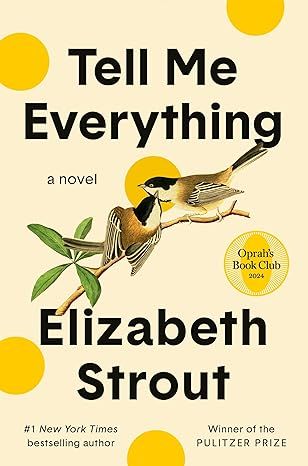
Tell Me Everything: Oprah's Book Club: A Novel
4.5
-
2,665
$14.99
Similar Books
Best sellers
View all
The Tuscan Child
4.2
-
100,022
$8.39

The Thursday Murder Club: A Novel (A Thursday Murder Club Mystery)
4.3
-
155,575
$6.33

Sapiens: A Brief History of Humankind
4.6
-
140,302
$13.49

The Butterfly Garden (The Collector, 1)
4.3
-
88,556
$9.59

Things We Hide from the Light (Knockemout Series, 2)
4.4
-
94,890
$11.66

The Last Thing He Told Me: A Novel
4.3
-
154,085
$2.99

The Perfect Marriage: A Completely Gripping Psychological Suspense
4.3
-
143,196
$9.47

The Coworker
4.1
-
80,003
$13.48

First Lie Wins: A Novel (Random House Large Print)
4.3
-
54,062
$14.99

Mile High (Windy City Series Book 1)
4.4
-
59,745
$16.19

Layla
4.2
-
107,613
$8.99

The Locked Door
4.4
-
94,673
$8.53
